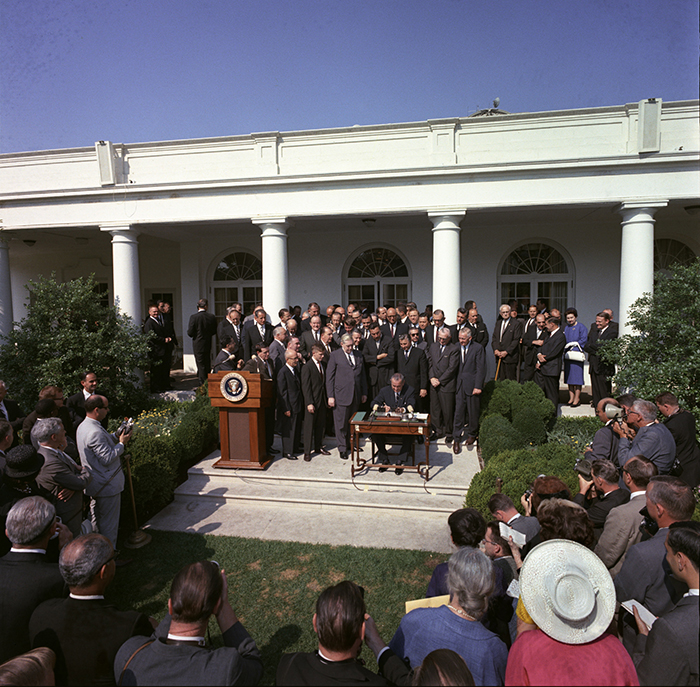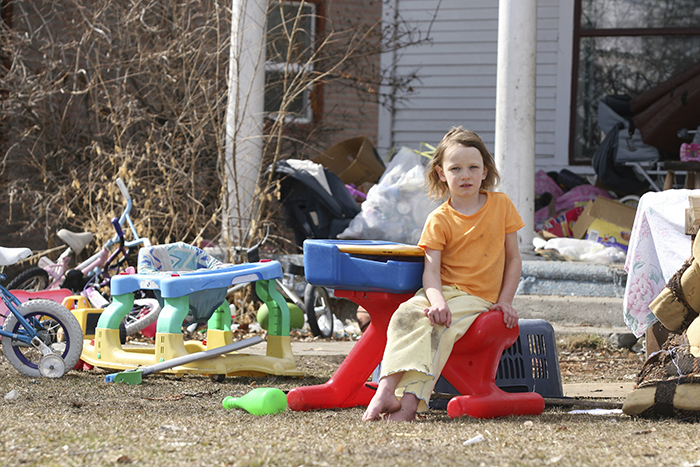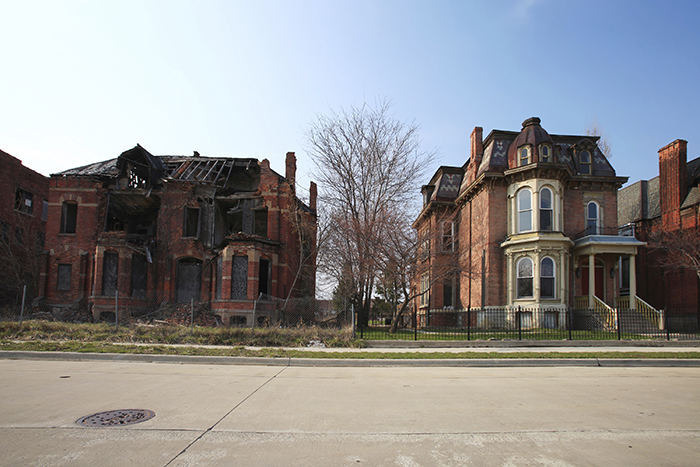 It had all the marks of a transformational moment in American life. When President Lyndon B. Johnson declared “unconditional war on poverty” in 1964, around 19 percent of the nation lived in poverty. For the first time a sitting president was prepared to marshall all the nation’s resources to combat it.
It had all the marks of a transformational moment in American life. When President Lyndon B. Johnson declared “unconditional war on poverty” in 1964, around 19 percent of the nation lived in poverty. For the first time a sitting president was prepared to marshall all the nation’s resources to combat it.
“We shall not rest until that war is won,” Johnson said in his State of the Union address that year. “The richest nation on Earth can afford to win it. We cannot afford to lose it.”
Fifty years later, victory in the war remains elusive. Poverty rates, after dipping dramatically in the late 1960s and 1970s, are again on the rise, currently circling around 15 percent, or 46 million people. It’s especially prevalent in regions where evangelical Christians — including Baptists — have a strong presence: across the Deep South and along the Mississippi Delta, where the victims are mostly black; in Hispanic communities in Texas’s Rio Grande Valley; in Native American reservations in the Southwest; and in largely white Appalachia.
Evaluating poverty is both difficult and contentious. There’s disagreement even about the percentages. A metric adopted by the U.S. Census Bureau in 2011, which attempts at a more accurate picture than earlier measurements by counting the government resources the needy have and the bills they have to pay, suggests a much slower rise in poverty and lower numbers of people impacted by it.
But what often arouses the most passion in the poverty debate is the role of massive government programs, whether the initial success of the war on poverty can be attributed to them and, most importantly, whether that aggressive government intervention should be replicated today.
“[The war on poverty] was a triumph until it stopped being a priority in this country,” says Krisanne Vaillancourt-Murphy, interim director of church relations for the anti-hunger advocacy group Bread for the World. “The programs coming out of the war on poverty helped cut poverty by 25 percent and it wasn’t until [those programs] were cut that their effectiveness was altered.”
Dee Dee Hoosier, a Christian social ministries organizer in Appalachia, isn’t so sure.
“It is an incomplete project,” says Hoosier, director of the Virginia Baptist-funded Bland Ministry Center about 30 miles south of Bluefield, Va. “We have to educate families on how to be self-sufficient. Government rules and regulations tend to make individuals fit into a certain mold, rather than trying to help their individual needs.”
But Christians — both advocates of government programs and those who focus exclusively on church-based solutions — acknowledge a biblical demand to engage those who live in poverty.
“With poverty, we’re not taking an objective view,” says Jeremy Everett, director of the Texas Hunger Initiative of Baylor University’s School of Social Work. “As people of faith we are called to address poverty. We don’t have a choice as Christians. We might have a choice in how we engage it but not whether we engage it.”
“The faith-based community has to become passionate about poverty,” agrees Hoosier, who says she’s seeing one-time donors to the Bland Ministry Center becoming recipients of its services.
Complicating the debate are underlying, often poorly understood, systemic factors. Among them is a pronounced racial and ethnic component. Poverty in black and Hispanic communities is consistently higher than in white or Asian-American ones. The Census Bureau’s alternative measurement, while reporting lower poverty rates, reflects the same relative trends among minority groups as the older metric.
Without addressing those systemic issues, poverty will remain intractable, says the head of an intentional Christian community in North Carolina.
 “There have been some gains made against the effects of poverty — developing efficient systems to distribute secondhand food products or broadening Medicaid coverage to include poor children and pregnant women below a certain income threshold.” says Greg Jarrell of The Family Tree in Charlotte.
“There have been some gains made against the effects of poverty — developing efficient systems to distribute secondhand food products or broadening Medicaid coverage to include poor children and pregnant women below a certain income threshold.” says Greg Jarrell of The Family Tree in Charlotte.
“But we have not addressed the imbalance of power that keeps people poor. And in some ways, the systems that keep some people or neighborhoods poor have become even more pernicious, yet more hidden and therefore harder to address.”
That means giving the poor themselves a voice in determining how poverty is addressed, says Jarrell, a graduate of Baptist Theological Seminary at Richmond.
“Many of our charity efforts still locate their power structures outside of poor neighborhoods. Charity is something we do to the poor. Lasting change comes when churches, government agencies, nonprofits and others put the poor in charge. Institutional power has to be shifted to the poor so that we have to listen to their voices and follow their lead.”
Additional systemic changes are necessary, say other observers.
“[Continuing poverty] may say more about the education challenges faced by our country,” says Gus Reyes, director of the Texas Baptist Christian Life Commission. “The fact remains that a complete education continues to open doors and change futures. We have an opportunity to help marginalized groups attain a brighter future through a faith in Christ and a solid education.”
Statistics suggest Reyes is right. Last year the Bureau of Labor Statistics reported that just 2.4 percent of college-educated workers fell below the poverty line. But 9.2 percent of high-school graduates in the labor force were classified as working poor, as were 20.1 percent of those who never finished high school.
Bread for the World’s Vaillancourt-Murphy says a lack of jobs also allows poverty to persist.
“The focus of government and the private sector should be on job creation, especially in areas that have high poverty rates. Poverty tends to affect the most vulnerable in society because they tend to have little to no voice when it comes to legislation that directly affects them. What we try to do is engage people to urge their congressperson so that they are properly represented when it comes to issues like income inequality, raising the minimum wage or investing in human capital.”
 Again statistics tell the story. The 2013 Bureau of Labor Statistics report also noted, unsurprisingly, that 4.2 percent of full-time workers live in poverty, while among part-time workers the rate was 14.4 percent. For those without any job, the rate soars, though reports vary.
Again statistics tell the story. The 2013 Bureau of Labor Statistics report also noted, unsurprisingly, that 4.2 percent of full-time workers live in poverty, while among part-time workers the rate was 14.4 percent. For those without any job, the rate soars, though reports vary.
Everett of the Texas Hunger Initiative says there’s at least one obvious response.
“We know a way to both significantly cut federal entitlement programs, save expenditures for the federal government and increase tax revenue. All it takes is for us to raise the minimum wage rate.”
About a quarter of American jobs pay salaries below the poverty line of $23,021 for a family of four.
Everett disputes claims that raising the minimum wage would disrupt the nation’s economy.
“At the minimum wage you only make $14,000 a year. If we raise the rate to what it would have been if it had kept up with inflation, that would significantly affect the well-being of low-income Americans. They could pay for their own food, which ultimately we want them to do.
“It won’t shock the system. It would be a major step forward.”
Some practices which keep people in poverty — such as pay day lending — can easily be addressed by churches.
“I’ve seen all types of churches respond to the economic injustice of predatory lending,” says Stephen Reeves, associate coordinator of partnerships and advocacy for the Cooperative Baptist Fellowship. “They have done so by offering financial education and affordable loan alternatives to their neighbors as well as advocating for more just laws on the local, state and national level.
“It’s unfortunate that for so long many churches in the U.S. have ignored preaching and teaching a biblical view of ethical business practices. By articulating and promoting an understanding of business practices that do not take advantage of the desperation of fellow citizens, churches can make an immediate impact that will help the poor.”
Ultimately, say most observers of poverty, the choice between government programs and faith-based solutions is a false one. Collaboration is essential.
“This is a huge issue that faces our country and our world,” says the Christian Life Commission’s Reyes. “It is going to take a collaborative effort by many to make the kind of progress necessary for impact and resolution. We all have a stake in the solution.”
Says Everett, “When we collaborate we participate with God and we get the divine multiplier effect. It’s like the [biblical account] of the feeding of the 5,000 — it doesn’t seem that you can do it, but you can when God moves. When different groups come together, they seem to be collaborating with something much larger than themselves.”
And that may require churches to shift their theological thinking to adopt a “posture of repentance,” says Jarrell.
“We need to say to the poor, ‘We are sorry. We repent of what we have done and what we have failed to do. We have been given much, and we have chosen to provide you with dented cans and secondhand clothes every other Thursday from 10 to noon. Please forgive us.”
He adds: “Until we can name the power that we have and repent of how we have misused it — often with good intentions — then I’m not sure why poor people will trust us to work with them. When we address power, then we can start to address poverty more deeply.”
— This article was first published in Herald, BNG’s magazine sent five times a year to donors to the Annual Fund. Bulk copies are also mailed to BNG’s Church Champion congregations.
See related stories:
